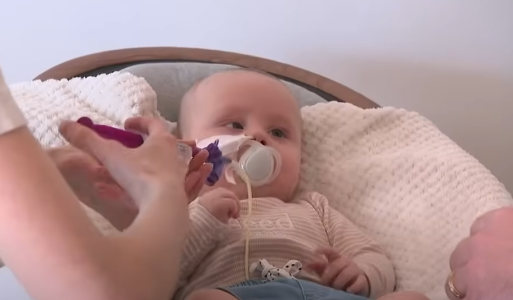$500M therapy centre gathers dust while Aussie cancer patients fight for treatment abroad
By
Gian T
- Replies 2
Access to critical cancer treatments remains a challenge, with some families seeking care overseas despite the availability of advanced medical technology at home.
This has led to growing calls for greater support and funding to ensure patients receive the treatment they need.
Experts highlight the benefits of cutting-edge therapies known for their precision and reduced long-term risks, particularly for younger patients.
However, the stark reality for Australian families is that this advanced therapy is not available on home soil.
Instead, they are faced with the daunting prospect of travelling to the United States, where the treatment is accessible but comes with a hefty price tag.
The financial burden is immense, with costs running into the thousands, and for many, this means relying on the generosity of strangers through online fundraisers or plunging into debt.
The Marchmont family's story is a heart-wrenching example of this ordeal.
Robbie and Beth Marchmont have had to fly their five-year-old son, Ted, to Jacksonville, Florida, for his brain cancer treatment.
'It’s a really tough pill to swallow to be told that your child has brain cancer,' Robbie said.
'It makes it even harder to hear that the correct treatment is only available overseas.'
The emotional and financial strain of such a journey is immense, and the Marchmonts' situation is echoed by many other Australian families in similar predicaments.
In 2017, the Turnbull government allocated $70 million to establish Australia's first proton therapy centre in Adelaide.
The $500 million cutting-edge facility, the Australian Bragg Centre for Proton Therapy and Research was envisioned as a beacon of hope for patients battling rare and complex cancers.
Yet, in a turn of events that has left many bewildered and frustrated, the South Australian state government terminated the contract with ProTom International, the U.S. company supplying the proton therapy machine, due to funding issues.
The current state of affairs has left the state-of-the-art facility empty, with no clear timeline for when it will become operational.
Health Minister Chris Picton's recent inability to provide concrete answers regarding a new contract has only added to the uncertainty and urgency of the situation.
'Obviously, this is being managed as it has been for the last six or so years by the Treasurer and the Department of Treasury and Finance...the short answer is we are still working on it, and we are hopeful we can work to find another solution,' he said.
Meanwhile, families continue to endure the added stress of applying for Commonwealth grants to help cover the costs of overseas treatment.
The story of Cruz, a four-month-old Perth boy with a brain tumour, is another stark reminder of the dire need for local access to proton beam therapy.
His parents, Shannon O’Mahony and her partner, are preparing for the arduous journey to Florida, a trip fraught with anxiety and the unknown.
A GoFundMe campaign has been launched to support Cruz's treatment and rehabilitation, highlighting the community's role in rallying behind these families.
As these Australian families navigate the challenging path of cancer treatment abroad, the question looms large:
When will the Australian Bragg Centre for Proton Therapy and Research open its doors to those in need?
The situation is a stark reminder of the gaps in our healthcare system and the urgent need for action to ensure that no more families have to endure the added burden of seeking life-saving treatments far from home.
We at the Seniors Discount Club stand in solidarity with these families and urge our members to voice their support for the funding and opening of the Adelaide proton therapy centre.
Credit: YouTube

How can patients get life-saving treatment without going overseas? What can be done to open the proton therapy centre faster? Share your thoughts and opinions in the comments below.
This has led to growing calls for greater support and funding to ensure patients receive the treatment they need.
Experts highlight the benefits of cutting-edge therapies known for their precision and reduced long-term risks, particularly for younger patients.
However, the stark reality for Australian families is that this advanced therapy is not available on home soil.
Instead, they are faced with the daunting prospect of travelling to the United States, where the treatment is accessible but comes with a hefty price tag.
The financial burden is immense, with costs running into the thousands, and for many, this means relying on the generosity of strangers through online fundraisers or plunging into debt.
The Marchmont family's story is a heart-wrenching example of this ordeal.
Robbie and Beth Marchmont have had to fly their five-year-old son, Ted, to Jacksonville, Florida, for his brain cancer treatment.
'It’s a really tough pill to swallow to be told that your child has brain cancer,' Robbie said.
'It makes it even harder to hear that the correct treatment is only available overseas.'
The emotional and financial strain of such a journey is immense, and the Marchmonts' situation is echoed by many other Australian families in similar predicaments.
In 2017, the Turnbull government allocated $70 million to establish Australia's first proton therapy centre in Adelaide.
The $500 million cutting-edge facility, the Australian Bragg Centre for Proton Therapy and Research was envisioned as a beacon of hope for patients battling rare and complex cancers.
Yet, in a turn of events that has left many bewildered and frustrated, the South Australian state government terminated the contract with ProTom International, the U.S. company supplying the proton therapy machine, due to funding issues.
The current state of affairs has left the state-of-the-art facility empty, with no clear timeline for when it will become operational.
Health Minister Chris Picton's recent inability to provide concrete answers regarding a new contract has only added to the uncertainty and urgency of the situation.
'Obviously, this is being managed as it has been for the last six or so years by the Treasurer and the Department of Treasury and Finance...the short answer is we are still working on it, and we are hopeful we can work to find another solution,' he said.
Meanwhile, families continue to endure the added stress of applying for Commonwealth grants to help cover the costs of overseas treatment.
The story of Cruz, a four-month-old Perth boy with a brain tumour, is another stark reminder of the dire need for local access to proton beam therapy.
His parents, Shannon O’Mahony and her partner, are preparing for the arduous journey to Florida, a trip fraught with anxiety and the unknown.
A GoFundMe campaign has been launched to support Cruz's treatment and rehabilitation, highlighting the community's role in rallying behind these families.
As these Australian families navigate the challenging path of cancer treatment abroad, the question looms large:
When will the Australian Bragg Centre for Proton Therapy and Research open its doors to those in need?
The situation is a stark reminder of the gaps in our healthcare system and the urgent need for action to ensure that no more families have to endure the added burden of seeking life-saving treatments far from home.
We at the Seniors Discount Club stand in solidarity with these families and urge our members to voice their support for the funding and opening of the Adelaide proton therapy centre.
Credit: YouTube
Key Takeaways
- Australian cancer patients, including children, are being forced to travel to the USA for proton beam therapy due to the absence of such a facility in Australia.
- Despite government investment, a $500 million proton therapy centre in Adelaide remains unused following contractual and funding issues.
- Families face significant financial burdens and rely on fundraising to afford life-saving treatment overseas.
- The federal and state governments acknowledge the issue and work towards a solution, while the state-of-the-art centre's future remains uncertain.
Last edited:








